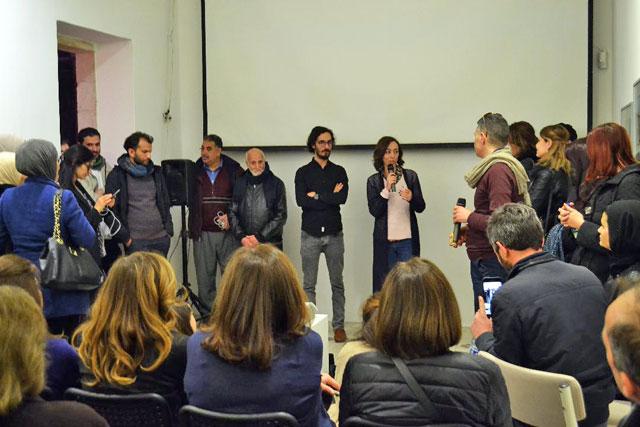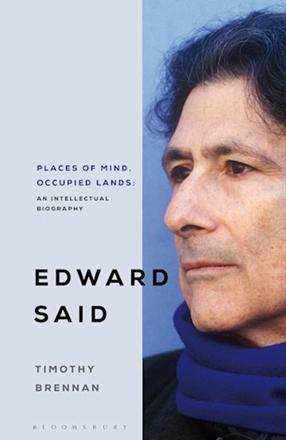You are here
Edward Said documentary depicting renowned author’s desire to belong screens in Amman
By Yasmeen Kanaan - Jan 27,2019 - Last updated at Jan 27,2019

Filmmakers Heba Bourini and Mohammad Jameel (centre) hold a question-and-answer session after the screening of a documentary on Edward Said on Tuesday (Photo by Yasmeen Kanaan)
AMMAN — The legacy of celebrated intellectual and prolific writer Edward W. Said was screened in a documentary in Darat Al Funun on Tuesday, which focused on the renowned author’s Palestinian background and his “out of place” book and psychological state.
The film depicts Edward Said’s desire for belonging after his diagnosis with leukaemia in 1991. His diagnosis spurred him to write a memoir; documenting his “out of place” identity in the lost Arab world.
“There are numerous Palestinians and Arabs who have never heard of Edward Said. This documentary is a key motive for Arabs to educate themselves and read about him,” the directors of the documentary said.
Filmmakers Heba Bourini and Mohammad Jameel, said the film shed light on the “split identity” Edward experienced — being born in Palestine with a British first name, an Arab last name and an American passport.
“Edward Said is one of several proposals we have presented as a production company to Al Jazeera Documentary. We make sure that all the characters we propose are of a moral and intellectual significance to viewers, especially when it comes to national causes, mainly Palestinian,” Bourini told to The Jordan Times during a discussion session following the screening.
Jameel added that they were keen on “maintaining a focus on Said being a Palestinian figure, without allowing the Palestinian cause and the long-running Palestinian-Israeli conflict to overshadow the documentary and the former Columbia University scholar’s universality and status as one of the leading literary critics of the last quarter of the 20th century”.
“The Palestinian conflict is dominant enough to take over any other subject,” Jameel said, commenting on the challenge of directing the film without shifting its focus. “This key aspect is what differentiates this documentary from others.”
When asked by The Jordan Times whether their documentary would depict Said as a Palestinian figure contrary to his internationally-recognised status as a global thinker, Bourini said, “The fact that Said is too big to be framed as belonging to certain geography does not contradict our endeavour to shed light on his Palestinian side.”
Edward Said is best known for his “Orientalism” and other books including, “Culture and Imperialism”, “Out of Place”, “The World, the Text and the Critic” and “Covering Islam”.
“Out of Place” is the account of Said’s life prior to his professional career and an insightful work into the many paradoxes of his identity as a public intellectual, literary theorist and political activist.
“Said has left behind a huge legacy in comparative literature and literary studies, and the Palestinian cause was introduced to his work after ‘Orientalism’,” Jameel told The Jordan Times.
Noam Chomsky, the founder of modern linguistics and a prolific critic, was interviewed in the film discussing Said’s legacy, in addition to Columbia University professors Hamid Dabashi and Gauri Viswanathan, Robert Fisk, Elias Khoury and Joseph Massad.
“He saw being ‘out of place’ as a psychological state of things… as a physical characterisation. He saw ‘out of place’ also as a moving reflection on being out of place — the place being Palestine,” said Viswanathan.
“With the death of Edward Said, we immigrant intellectuals ceased to be immigrants and became native to a new organicity. We are the fulfilments of his battles. He theorised himself to be ‘out of place’ so timely and so punctiliously, so that after him we are no longer out of place, [we are] at home where ever we can hang our hat and say no to power,” Dabashi said.
Related Articles
Much has been written about Edward Said, but this is the first comprehensive biography in English of the renowned scholar, covering his personal, professional and political life. The author, Timothy Brennan, teaches in the humanities at the University of Minnesota and has written several scholarly books on world literature, making him well-informed on subjects close to Said’s heart. Brennan is obviously an admirer of Said but the book does not simply sing his praises. Rather, it is a critical review of the development of his thinking, writing, and influence over the years.
AMMAN — The global influence of renowned Arab-American intellectual Edward Said remains in every corner of the world, according to an Americ
AMMAN — Minister of State for Media Affairs Jumana Ghunaimat mourned the death of journalist Muhammad Khair Bourini, who died on Friday.













